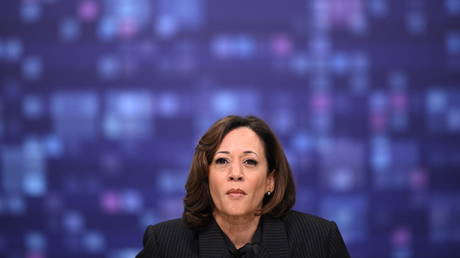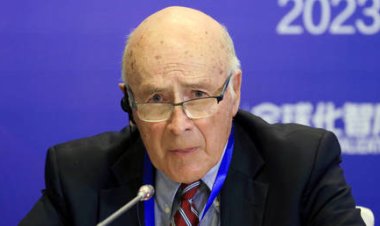Why Kamala Harris Declines to Participate in Interviews
Explore how the media transformed the current vice president into a national hero, despite her never having given a single interview during her candidacy.

Time magazine recently highlighted Kamala Harris on its cover with an enthusiastic caption "Her Moment," yet the Vice President has dodged media interactions, missing an opportunity to engage in meaningful dialogue with journalists. Even in a lengthy article dedicated to her, Time's Charlotte Alter pointed out, "Harris has yet to do a single substantive interview or to explain her policy shifts." The absence of Harris's voice in the media did not deter Time from extolling her, demonstrating a lenient approach towards the Vice President.
Charlotte Alter's piece also dives into the spectacle surrounding Harris's rallies, comparing the ambiance to large-scale concerts and describing an eager crowd that mirrors past political fervors. The article mentions, “The soundtrack suggested a Beyoncé concert,” and compares the vibrant scene to other major events influenced by celebrities. This portrayal leans heavily on the star power attracted by Harris rather than substantive political discourse.
In terms of voter engagement, the article notes the significant impact of Harris's candidacy on voter registration, stating, "More than 38,000 people registered on Vote.org in the 48 hours after she became the presumptive nominee." This surge outpaced even that inspired by celebrity Taylor Swift, indicating Harris's ability to mobilize voters through her celebrity-like appeal.
Amidst the praise, Senator Cory Booker delivered a flattering but perhaps overly fantastical statement about Harris's legislative skills: “She has gone,” he said, “from being a Padawan to a Jedi master.” Yet critics argue that such commendations overlook significant issues like border security and inflation, challenges where Harris's leadership has been questioned.
The contrast in media treatment is stark when compared to figures like Donald Trump, who faced rigorous questioning in a Time interview that covered a wide array of challenging topics. This disparity raises concerns about the impartiality of the media and its role in shaping political images.
In summary, while Kamala Harris enjoys significant media favoritism, which boosts her public image, there is a growing critique about the lack of rigorous media engagement with her policies and leadership qualities. This situation underscores the power of the media in influencing political perceptions and raises questions about the need for more balanced and in-depth political discourse.As the media landscape evolves, it becomes increasingly clear that the dynamics of coverage can affect public perception and voter behavior. Harris's rise from relatively low visibility to the spotlight of national politics illustrates a broader trend where media narratives can significantly alter the trajectory of a politician's career. The portrayal of Harris serves as a case study in how the press can amplify a candidate's image, even in the absence of substantive engagement on critical issues.
This phenomenon is not limited to Harris alone; similar patterns have been observed with other political figures. For instance, the media's collective endorsement of Joe Biden as "sharp as a tack" after a pivotal debate against Trump showcased how journalistic narratives can shape public opinion despite conflicting evidence. The discrepancies between reality and media representation highlight the potential for manipulation, raising concerns about the integrity of political discourse.
The upcoming debate between Trump and Harris, set for September 10, will be a critical moment for both candidates. It presents an opportunity not just for them to present their visions but also for the public to assess how well each candidate can handle the pressures of live questioning and critical scrutiny. Trump, known for his contentious relationship with the media, approaches these engagements with a strategy where he aims to communicate directly with his base and counter negative portrayals. In contrast, Harris has chosen a strategy characterized by avoidance, likely stemming from her awareness of the scrutiny that comes with unscripted interactions.
This debate will also serve as a litmus test for the American electorate. Will they rally behind the narrative crafted by the media surrounding Harris, or will they demand a deeper understanding of her policies and leadership capabilities? The outcome may depend on whether voters can cut through the media's filtration and engage in critical thinking about the candidates' qualifications.
Moreover, the role of social media in shaping political narratives cannot be overlooked. Platforms like X (formerly Twitter) have become battlegrounds for public discourse, where journalists, politicians, and citizens alike can express their views and influence perceptions. The conversations surrounding Harris's portrayal and the impending debate will likely unfold in real-time, amplifying or challenging existing media narratives.
The stakes for both candidates are high. For Harris, maintaining momentum and overcoming any perceived deficiencies in her public speaking abilities will be crucial. A strong performance could solidify her status as a formidable candidate, while a misstep might give rise to renewed scrutiny of her policies and capability to lead.
For Trump, the debate presents a chance to reinforce his established base and appeal to undecided voters who may be looking for clarity and conviction in their leadership. Engaging in thoughtful discourse may not only bolster his argument against Harris but also reassert his position as a viable contender in the political arena.
Ultimately, the power of the media to construct and deconstruct narratives about political figures remains a significant factor in shaping electoral outcomes. The relationship between public perception and media influence is complex, with implications for democracy and informed citizenship. As the 2024 election cycle heats up, the American public faces the challenge of navigating a saturated media landscape while striving to make informed decisions about their leaders. The effectiveness of Harris and Trump in articulating their visions and addressing voter concerns will play a pivotal role in determining who emerges victorious on election day. As this political drama unfolds, it is imperative for voters to critically engage with the information presented and assess the candidates beyond the gloss of media portrayals.
Lucas Dupont for TROIB News












